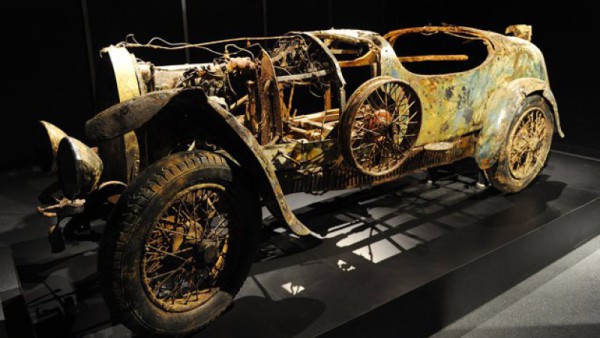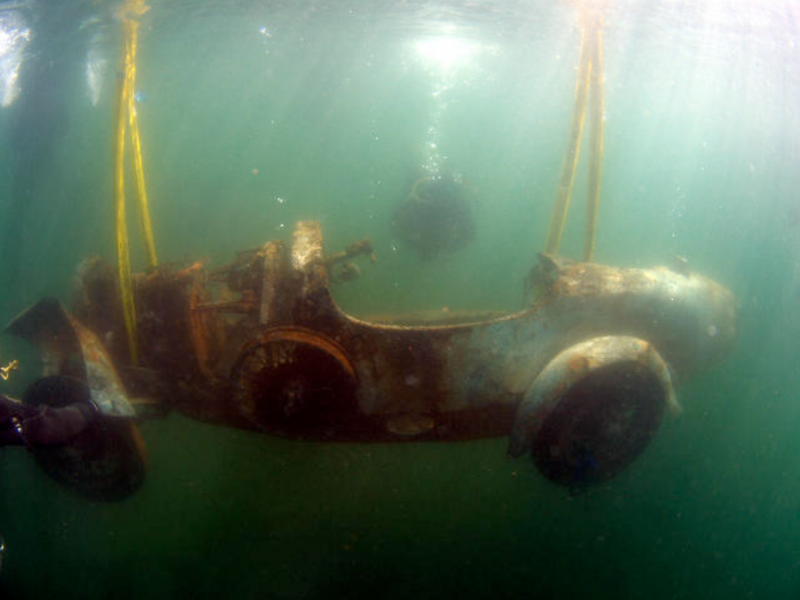I often have many cars in my fantasy garage. OK Jay Leno has a real life fantasy garage but we can all dream, right?
In my fantasy garage all the vehicles are in show condition – not a speck of dust or rust in sight. Who would want a rust bucket in their garage. However, I have just changed my mind….
From about 1935 until 2009, a custom built, vintage 1925 Bugatti Type 22 Brescia Roadster sat at the bottom of Lake Maggiore on the border of Switzerland and Italy near the country of France. The car sold in 2010 for US$360,000 in this condition … and will not be restored.

Built in Brescia, Italy, the touring car was initially registered in Nancy, France. A small brass plate found on the car bears the name ‘George Nielly, 48 Rue Nollet, Paris’ who was probably the owner in 1930.
The car has four cylinders, a 1.5 litre engine and was able to achieve a speed of close to 100 miles an hour, a remarkable feat at the time.
At some point, the vehicle changed hands again to, according to local stories, legendary Grand Prix driver René Dreyfus who lost it in a drunken poker game to Swiss playboy Adalbert Bodé in Paris in 1934 or it may have come into the possession of Marco (Max) Schmuklerski, a Zurich-born architect of Polish descent.

Schmuklerski, who studied architecture at the very prestigious École des Beaux-Arts in Paris, may have acquired the car at that time. From whom is not known. He brought the Roadster back to Switzerland and put the vehicle into storage but neglected to pay the import duties. When officials learned of the unpaid tax they seized the vehicle.
The cost of the import duties was more than the car was worth so the officials decided to destroy it. The locals say that Bodé attempted cross the border into Switzerland with the car but was unable to pay the import duties.
Bodé advised the officials to do as they pleased with the car as it had minimal value at the time and walked away.
No matter how it came about, the Swiss officials simply rolled the vehicle into the lake where it sank to the bottom.
The Bugatti was not seen again until 1967 when diver Ugo Pillon located the wreck. It became a popular dive spot for over forty years until 2009 when a local dive club rescued the car from the bottom of the lake.
A young local man, Damano Tamagni was attacked and killed in a random act of violence. In response to this tragedy, the club helped set up a nonprofit foundation in Tamagni’s name in order to fight youth violence. The intent was to sell the vintage Bugatti to raise funds.

Bugatti was back in business, and so was the Type 13. Photo Credit
The task took nine months to complete with thirty volunteers, and the car was finally recovered. There are still patches of the original blue paint, and the tires were still inflated when it was brought to the surface.
The car was prepared for Bonhams’ auction at the Retromobile in Paris and in January 2010 Peter Mullin of the Mullin Automotive Museum in Oxnard, California bought the car for around $370,000. It is on display at the Oxnard Museum located in a private room.
At the time Bonhams said: Over the course of the past few months, the car offered here has become one of the most celebrated of all Bugattis, having lain submerged beneath the waters of Lake Maggiore in Switzerland for more than 70 years. The whereabouts of the sunken Bugatti had been known to the local sub aqua club for many years but in February 2008 a tragedy occurred that would eventually lead to its retrieval.
On the 1st of that month, Damiano Tamagni was attacked by three youths and beaten so severely that he later died from his injuries. Damiano and his father Maurizio were both members of the local sub aqua club in Ascona (Centro Sport Subacquei Salvataggio Ascona, CSSS) and it was decided to raise the Bugatti and use the funds from its sale to further the work of a charity set up in Damiano’s name, ‘Fondazione Damiano Tamagi’, which seeks to address the issue of juvenile violence.
The car, still a rusted heap, is kept in a dimly lit room reminiscent of the conditions found at the bottom of the lake and is displayed more as a work of art than just an antique car.
“This is a car that’s had many different lives,” says museum curator Andrew Reilly. “Here’s a twin-plug competition car, re-bodied to carry its current torpedo body. It has been known to have belonged to René Dreyfus, then lost in a card game in Paris.
It was pushed into the lake, it became a part of local lore, it became a tourist attraction. Depending on what part of its lifespan you focus on, you come away with a different appreciation.
If the focus is on the young man who lost his life, it is a somber part of the story.
The faded grandeur of great pre-war cars suffering certain indignities is another. The watery crypt and silence and darkness this car survived in lends itself to another solemn experience.”
